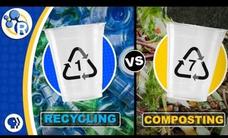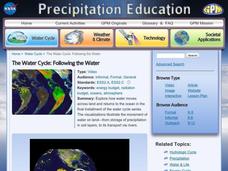SciShow
Why We Love Sugar
Now that's sour! Did you know lemons contain more sugar than strawberries? Here is a resource that helps pupils explore sugar, where it comes from, different types, why organisms need it, and how much we ingest.
Be Smart
How Much Plastic is in the Ocean?
Plastics in our oceans not only create unsightly litter, but they also threaten habitats. A video episode maps the location of the majority of the plastic debris and explains the impact the debris has on our world. The lesson also...
American Chemical Society
Can Plastic Be Composted?
Some plastics market as green, but are they really? Turns out, the question is a complicated one. A video lesson describes how these new plastics may have some decomposing properties but need a little boost from industry. The lesson...
Nature League
Searching for Mysis Shrimp - Field Trip
Surely, the biggest fish in the lake will benefit from a meal of big, tasty shrimp! Take biology scholars on a trip to Flathead Lake in the second of a five-part Invertebrates series. Scientists currently studying the lake take the...
University of California
What Does Sugar Actually Do To Your Body?
Eat less sugar; you are sweet enough already. The video explains how the body processes glucose and fructose, then highlights the differences and results of both. It also includes suggestions for staying healthy.
SciShow
Caffeine!
Caffeine is a mild stimulant for the nervous system and in moderation, is not harmful to the body. The narrator discusses sources of caffeine, its chemical make-up, and what it does inside the human body. He also shares the recommended...
SciShow
The Deal with Fat
Fats are essential to a balanced diet and help bodies use certain vitamins as well as maintain healthy skin and hair. While watching the video, learners explore fat, which is certainly talked about a lot in terms of health. The narrator...
TED-Ed
The Life Cycle of a T-Shirt
Did you know that 2,700 liters of water are required to produce just one t-shirt? Or that cotton uses more insecticides and pesticides than any other crop? An engaging video traces the cycle of t-shirt production from cotton bolls to the...
The School of Life
Political Theory - Adam Smith
Can capitalism have virtue? Adam Smith thinks so! The 12th video in a series of 13 discusses Smith's political and economic views. Pupils discover these concepts and more through primary source photographs and examples that relate to...
TED-Ed
What Is Fat?
An animated fat molecule explains how some fats are beneficial and some are harmful. He describes triglyceride molecules and how the chemical bonding or overall shape determines the health value of each individual type of fat. This...
TED-Ed
Why Doesn’t Anything Stick to Teflon?
Since it was accidentally discovered in 1938, polytetrafluoroethylene—otherwise known as Teflon—has made its way into many different products. Watch an informative video that describes the science in making Teflon, and its benefits to...
PBS
Real-Life Math | Chef
Cook up a lesson on unit conversions. Scholars brainstorm how chefs use math in restaurants, and then watch a video of a real chef explaining how unit conversions, food and supply costs, portion sizes, and payroll all require math. They...
DiscoverE
Everyday Engineering: Colorful Chemistry
Watch red cabbage juice turn green. Pupils first watch a video that takes them through the process of creating red cabbage juice. They then add various solids and liquids to the juice and use the color change to determine whether the...
The Brain Scoop
The Man-Eating Lions of Tsavo
When railroad workers arrived in Kenya in 1898, they were greeted by some very hungry lions. Introduce young ecologists to the man-eating lions of Tsavo with a video from an extensive playlist exploring mammals. Topics include unusual...
Bozeman Science
ESS3C - Human Impacts on Earth Systems
The human impact on the earth's systems often has unintended consequences. A comprehensive video lesson builds a progression for teaching the standards ESS3C in elementary through secondary classrooms. Instruction focuses on the human...
American Chemical Society
Accidental Discoveries That Changed The World
When they run out of lemons, scientists study lemonade! Many scientific discoveries came from dead-end experiments. The episode of the ACS Reactions series shows how scientists make many discoveries by accident. The highlight of the...
American Chemical Society
Can I Still Eat This?
The United States sends 133 billion pounds of edible food to landfills every year. A lesson from the ACS Reaction series discusses the chemical reactions that cause food to change over time. Some reactions make food taste different while...
American Chemical Society
How Does Tylenol Work? The Truth Is—We Don't Know
Surprise—even pharmacists don't know how Tylenol works! An installment of the ACS Reaction series considers three theories that explain the function of acetaminophen, the ingredient in the popular pain reliever Tylenol. Scholars consider...
Crash Course
Digestive System (Part 3)
The large intestine is about five feet long — how is that possible?! An interesting video explores what happens when digestion and intestines don't work as intended. The 35th in a series of 47, the resource specifically teaches about the...
MinuteEarth
Love Letter to Food
Don't be rude to food! Scholars see the startling truth about food waste in a disturbing video. The series of statements from individuals around the country paints a picture of good intentions followed by wasteful habits like cooking too...
MinuteEarth
The Great North American Locust Plague
The largest locust swarm recorded in North America measured 110 miles wide and 1,800 miles long, making it roughly twice the size of Colorado. A video begins with what locusts are and where they came from then explains the damage they...
NASA
The Water Cycle: Heating the Ocean
There is more to the water cycle than simply rain and evaporation! The first installment in a four-part series explores the solar heating of the ocean through three satellite animations. The animations offer different views of the earth...
NASA
The Water Cycle: Following the Water
Water that leaves the oceans must eventually return. The animations in the final lesson of the four-part NASA series show the complex path water can take across landforms before returning to the ocean. Approximately one-third of the...
The Brain Scoop
Why Sharks?
Sharks have survived every major mass extinction in the history of the earth. Although the shark has had a good run, human interference threatens the survival of these formidable creatures. A video lesson explores creatures of the deep,...
Other popular searches
- Family and Consumer Sciences
- Family Consumer Science
- Consumer Science Foods
- Consumer Science Manners
- Health and Consumer Science
- Consumer Science Fibers
- Consumer Science Fibres
- Fm & Consumer Science
- Family & Consumer Sciences
- Consumer Science Fib Res
- Consumer Science Careers
- Food and Consumer Sciences

























